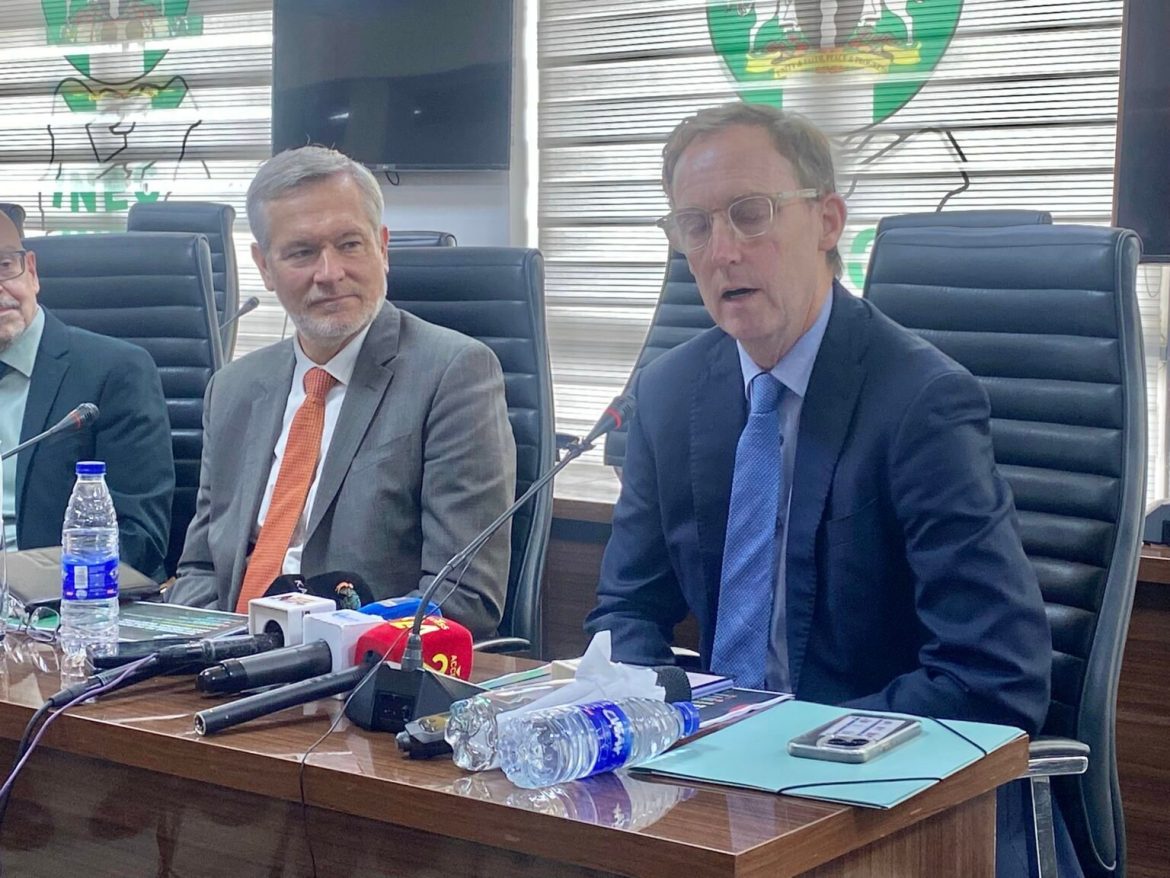1K
By Tracy Moses, Abuja
The European Union Election Observation Mission (EU EOM) has commended Nigeria for significant progress made in implementing electoral reforms since the 2023 general elections but issued a strong call for accelerated action on deeper constitutional and legislative changes.
The Mission warned that the credibility of the 2027 polls, and Nigeria’s democratic reputation on the global stage, depends on timely and far-reaching reforms.
Speaking in Abuja on Thirsday during a meeting with the Independent National Electoral Commission (INEC), Chief Observer of the EU EOM and Member of the European Parliament, Barry Andrews, described Nigeria as a pivotal democracy in Africa and a strategic partner in the global pursuit of democratic consolidation.
“It is a great honour to be back in Nigeria,” Andrews said, recalling his appointment by EU High Representative Josep Borrell to lead the observation mission during the 2023 elections. “In terms of scale, both financially and in personnel, the 2023 mission was one of the largest EU Election Observation Missions ever deployed. This reflects not only the strength of the relationship between the European Union and Nigeria but also Nigeria’s significance, both regionally and internationally.”
Andrews explained that the current visit was part of the EU’s traditional follow-up process aimed at assessing the extent to which recommendations from the 2023 mission have been implemented. Although he had only just arrived in the country, members of his team had been in Nigeria for the past three weeks and would remain for another week to complete their review.
He expressed satisfaction with the progress recorded so far, particularly on administrative and procedural reforms, but stressed that deeper judicial, legislative, and constitutional reforms would require more time and stronger political will. “Our recommendations are made in line with international standards which Nigeria and many other countries have committed to. Election observation is part of a global effort to strengthen and support democracy, not only in Africa but worldwide,” he said.
He also highlighted the reciprocal nature of election observation. “As an Irishman, I can note that Nigeria has sent election observers to Ireland during our presidential elections. We welcomed their constructive observations, and we are here in that same spirit of cooperation,” he remarked.
Andrews further noted the mission’s particular interest in INEC’s self-assessment of the 2023 elections, the conduct of off-cycle governorship elections since then, and improvements made in areas such as result transmission and publication transparency, key recommendations from the EU’s final report.
Welcoming the EU delegation, INEC Chairman, Mahmood Yakubu, lauded the European Union’s sustained partnership and described election observation and follow-up missions as critical to electoral improvement. He explained that the follow-up visit was part of a long-standing EU practice of evaluating reforms halfway between general elections and noted that this was the third such mission received by the current Commission.
Yakubu recalled that the EU Observation Mission made 30 recommendations after the 2019 elections, 11 of which were directed specifically to INEC. In comparison, the 2023 report contained 23 recommendations, with eight directed to the Commission and the remaining 15 requiring action by other institutions including the executive, legislature, judiciary, political parties, civil society organisations, the media, and professional bodies.
According to him, “We have taken action on those recommendations that require only administrative measures, while working jointly with other institutions on cross-cutting recommendations. For those that require legislative intervention, we await the conclusion of the ongoing review process by the National Assembly.”
Yakubu disclosed that a comprehensive response to each of the EU’s recommendations had been shared with the delegation, alongside a detailed review of the 2023 general elections containing 142 reform proposals. He noted that many of the EU’s recommendations would require amendments to the Electoral Act and even the Constitution.
“For this reason, the Commission has been engaging with the National Assembly, including a retreat with the Joint Committee on Electoral Matters in Lagos earlier this year. We appeal to the National Assembly for expeditious consideration of the electoral reform proposals. Early passage of the law is critical to election planning, as uncertainty over the legal framework can unsettle preparations,” Yakubu said.
Looking ahead, Yakubu reaffirmed INEC’s commitment to continued collaboration with international partners as Nigeria prepares for the 2027 elections.
He said, “We anticipate the next EU Election Observation Mission for the 2027 general election. As you rightly noted, international observation missions are deployed at the invitation of INEC. I want to reassure you that the Commission will continue to engage with the EU, the Commonwealth, the African Union, and ECOWAS as we prepare for 2027,” he said.
He emphasized that recommendations from international observer missions had consistently contributed to the improvement of Nigeria’s electoral processes. He expressed appreciation for the EU’s longstanding support through initiatives such as the European Union Support to Democratic Governance in Nigeria (EU-SDGN) and pledged to deepen this partnership in the coming years.
The visiting EU delegation included Barry Andrews, Chief Observer and Member of the European Parliament; Mr. Gautier Mignot, EU Ambassador to Nigeria and ECOWAS; Mr. Ralph-Michael Peters, Election Expert and Team Lead; Ms. Eirini-Maria Gounari, Election Legal Expert; Mr. Maros Gabriel, Election Administration Expert; and Ms. Laolu Olawumi, Programme Manager, Democracy and Rule of Law at the EU Delegation.



